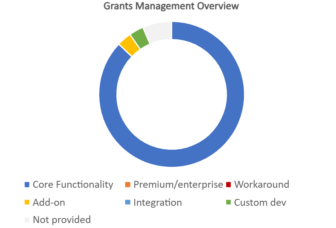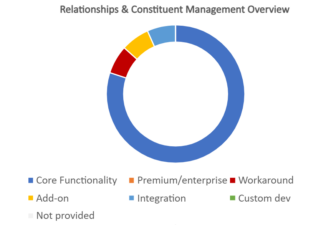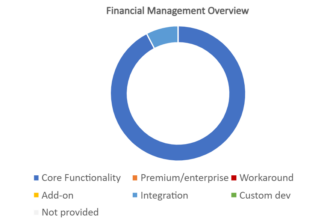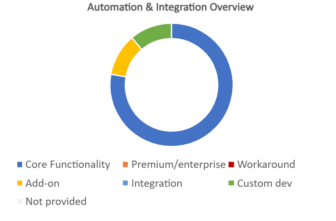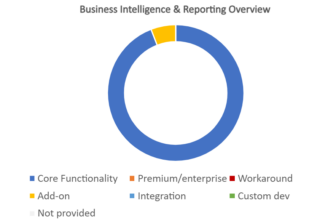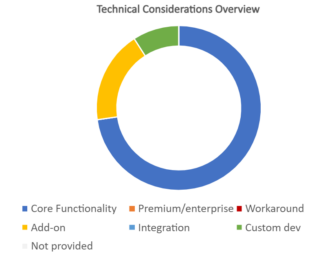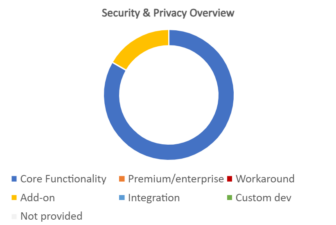Fluxx Grantmaker is a widely-used grants management system that is built around a relational database, which allows foundations to easily link related records and data across the system. The default system dashboard is set up as a series of unique, customizable, shareable cards, similar to a Kanban board, but users can also opt to view the system data in a more traditional tabular view. Cards can be arranged on the dashboard with drag-and-drop functionality. The optional Grantelligence add-on provides foundations with a powerful business intelligence tool built on the Domo platform that pulls in system data for in-depth reporting and that allows you to upload external data sources as well.
The majority of the vendor’s current customer base are mid-size and small foundations, public charities, and government organizations, but a significant number of large grantmakers use their platform. The vendor has a large presence in North America, Europe, and the Asia Pacific region. Global grantmakers are able to take advantage of the system’s online Google Translate integration for their external portals, as well as strong multi-currency support.
Vendor: Fluxx
Year Released: 2010
Pricing
The vendor notes that yearly subscription pricing is determined by the foundation’s annual giving and the number of add-on modules—for example, the Grantelligence BI tool, the reviewer portal, and integrations with external finance and/or CRM systems. All subscriptions include unlimited users, data usage, and document storage, as well as integrations with Candid Charity Check, Demographics via Candid, Microsoft 365, Docusign, and OFAC.
Implementation costs are not included in the yearly subscription pricing; new customers can choose one of four onboarding packages that range in price from $10,000 (Quick Start) to more than $54,250 (Transformation) depending on the amount of personalization the customer wants configured by Fluxx vs. by the customer post-implementation. Quick Start is a fast-track implementation that can get the system up-and-running in 4-6 weeks, with out-of-the-box functionality and self-service data migration. Other implementation packages offer more in-depth configuration and personalization of the system.
Estimated Yearly Costs
- Small Foundation (< $25 million in grants, 1-5 staff): $13,500-$35,500
- Mid-Size Foundation ($25-500 million in grants, 10-25 staff): $36,500-$267,000
- Large Foundation (> $500 million in grants, 50+ staff): $300,000+
Grants Management
The structure of Fluxx Grantmaker is such that related records are connected across the database, providing a holistic view of grants, grantees, and activities. Connected data appears in a tab on the top right of records, giving you the ability to click through to related organizations, contacts, and requests. Within a grant record, you can view interactions; assign tasks around the record to other staff members; use the system’s internal messaging tool (Signals) to tag other system users or applicants and create threaded discussions; add notes; create a risk register; and run due diligence checks. An integration with Candid GuideStar Charity Check allows you to use an organization’s EIN to save a certificate to the record that shows it was run against IRS information. It will also allow you to pull in additional data from GuideStar, such as the organization’s NTEE code, foundation code, and charitable status. Charity Check can be run on grant records or on organization records.
The system supports a variety of application types and processes. You can have individual and organization applications, open or invitation-only solicitations. There is no limit to the number of funding opportunities that can be open at the same time. Each program or funding opportunity can have its own application with different requirements, questions, and workflows. Ten different field types can be used in applications; applications can include branching and conditional logic and can capture impact metrics that can be used for future tracking and reporting. An integration with DocuSign allows foundations to capture signatures on applications. The vendor is currently testing a grant budget tracker that allows applicants to add line items to a budget that are then totaled in the sheet, and which can later be used to make expense reimbursement claims after the grant is approved; this feature is currently in use by a handful of customers and the vendor expects to release it later in 2024.
Multiple users can work on applications together, and you can add logic to limit the ability for a particular user to submit the application. The system also allows for a collaborative workspace where grantees can be linked to multiple organizations or multiple users to the same organization so that they can complete shared applications, submit follow up reports, and submit claims and reimbursements.
A grantee portal allows applicants and grantees to register for the system, view funding opportunities, see their grant history, submit reports, and check on grant payment schedules. They can request amendments and renewals, as well. The items users can see and take action on in the portal are governed by roles and profiles. Administrators can map eligibility requirements to each funding opportunity in the system and can show or hide certain things in the portal based on those eligibility requirements.
Organizations, primary contacts, and users don’t have to re-enter information already stored in Fluxx Grantmaker, or information they entered when registering for the applicant portal. There is no auto-save function in applications; applicants need to click the “Save and Continue” button in order to save the data they’ve entered. There is not currently the ability for applicants to complete applications offline and sync the data with the system after completing them, but the vendor reports it has created this functionality for another customer using fillable Adobe PDF forms and custom code.
A reviewer portal is also available as an optional add-on at an extra cost. This portal allows reviewers or panelists to see their assigned reviews and complete score sheets. Reviewers can see the score sheet side-by-side with the application, and you can control what application content reviewers are allowed to see. Administrators can determine whether to allow reviewers to see other reviewers’ scores once they submit their score sheets. You can perform a variety of calculations to get the total score, as well as average score, weighted scores, and rankings.
You can assign reviewers on a record-by-record basis or by using bulk actions; reviewers can be grouped together. When you assign an application to a reviewer, they will be notified via email. Reviewers can download the full contents of an application, but there is no way to complete reviews offline and have them sync with the system.
Relationships and Constituent Management
While not technically a CRM, Fluxx Grantmaker allows you to collect a great deal of information on contact records and to define relationships with other records across the system. The system supports both organization and individual records. Organization records can include data from the system’s integration with Candid Guidestar Charity Check, as well as demographic information from the system’s integration with Demographics via Candid. The demographic data synced from Candid displays on the record with the visualizations, but you are not able to use that in system reports. You can create relationships between records in the system that link out to other organizations, contacts, grants, or requests.
Fluxx comes pre-built with a card designed to track interactions, including meetings, phone conversations, and site visits. The Interactions card allows users to track interactions against the organization, contact, or application/grant record. You can also add custom fields to capture notes and other items. You can send emails through the system to individuals and groups. There are also integrations with MailChimp and Constant Contact for broadcast emails, and email opens and clicks from these tools are saved on individual records. Correspondence sent through the system is automatically saved to the contact record and a free Microsoft 365 integration allows you to save emails and attachments sent and received through Outlook to grant, organization, and payment records.
Templates for emails and documents can be created in the system, and you can also create templates within Microsoft Word via the Microsoft 365 integration. New versions of documents edited in word can be synced back to the system and managed with version control functionality. Documents generated from templates can be either PDF or Word format and are saved on the associated grant or organization record.
The system allows you to use the reviewer portal add-on to create a dedicated view for Board members that displays filtered cards and records relevant to their work. You can also build out cards for board meetings, adding grant summaries and other records for review.
Financial Management
Fluxx Grantmaker allows you to create payment schedules in several different ways. You can set up a default payment schedule, you can schedule payments individually, or you can schedule them in bulk. Once you schedule the payments, you can edit individual dates and make payments contingent on reporting requirements. You can split payments for a grant across multiple budgets. You can also store banking information for organizations securely in the system, masking account numbers once they have been uploaded.
The platform has integrations with a variety of finance platforms, including Oracle NetSuite, Sage Intaact, QuickBooks, and SAP. These integrations are available at an additional cost. You can also transfer payments data to other finance and accounting systems via CSV file exports and imports. When records are marked as ready for payment in the system, it will deduct the payment from the assigned budget, and once record of the payment has been received from the external finance platform or the completed CSV file is uploaded, it will mark the records as having been paid.
Budgets can be tracked by either the amount available, awarded, or paid in a particular year, or in hierarchically defined categories or program areas. Administrators can use previous years’ budgets as a base and adjust them for the current year and also use fund budgeting to predict cashflow needs based on scheduled payments. Program Related Investments (PRIs) have their own unique category within the system, which allows them to be stored, tracked. and reported on as a separate type, as well as tracking payment and repayments (with interest against the original award and funding source).
Automation and Integration
Depending on the implementation package selected, the vendor will work with new customers during their onboarding to build out a series of workflows based on the foundation’s grantmaking processes. New customers who select the Quick Start implementation package will receive a best practice-based workflow that comes out of the box but also have the ability to set up their own custom workflows within the system. You can have multiple workflows set up in the system and workflows can include conditional logic. Workflow buttons display at the bottom of the screen whenever you are viewing a record to allow you to easily update status. The workflow status bar can also be used to move records through the process and displays the current number of days a record has been in its current workflow state.
A large variety of automated emails can be set up in the system, including for task assignments, email reminders of payments coming due, reports coming due, and deadlines for applications to be submitted. The system will also send out automated reminders at set intervals. All these communications are saved within the corresponding records. The system also includes a number of bulk actions that you can perform on multiple records, including scheduling payments, updating workflow status, task assignment, email alerts, and document generation.
Fluxx Grantmaker includes a REST API available to all customers that allows them to build custom integrations with a variety of systems, including financial and accounting platforms, CRM systems, and business intelligence tools. It also has a connector with the iPaaS tool Workato that can be used to build integrations with systems like Salesforce and Sage Intacct. The vendor reports that it is currently building connectors with both Power Automate and Zapier that will be available later in 2024.
Fluxx Grantmaker offers numerous integrations with finance and accounting tools (Oracle NetSuite, SAP, Sage Intaact, QuickBooks, BILL, Concur) and email broadcast tools (MailChimp, Constant Contact), as well as integrations with Microsoft 365, Docusign, Candid Guidestar Charity Check, Demographics via Candid, and Google Translate. The integrations with finance tools are at an additional cost.
Business Intelligence and Reporting
There are two types of dashboards available for Fluxx clients: system dashboards, and dashboards via Grantelligence, a business intelligence tool available at an additional cost. System dashboards are comprised of cards. Cards that come standard with the system have data on grants management, budgeting, contact management, project management, reporting, due diligence, interactions, board meetings, and risk registers. You can also build out additional cards to store data in the system. You can display the contents of cards in summary view for quick data insights or list view for more detailed information.
The card-based system dashboard can also be switched to a more traditional table dashboard. From this view, you can change columns using drag and drop functionality, and filter records by status, program lead, the type of application, source of funding, other advanced level fields, or custom fields. You can also export all this information in a variety of formats. If you select a subset of records, you can enter “focus” mode, which automatically filters the connected data in the tabs at the top of the table so that it is only for the records you are focusing on.
Fluxx Grantelligence is a new analytics and reporting tool built on the platform Domo that is integrated with Grantmaker and available at an additional cost. Grantmaker data is sent over to Grantelligence in a daily sync and you can add external data (file uploads) as well. Each Grantelligence instance comes with pre-built datasets and two pre-built dashboards: the Grants Manager dashboard, to track things like programs, payments, assignment of tasks and records within the system; and the Executive dashboard, which shows how much is attributed across programs against budgets and geolocations. The vendor reports that additional pre-built dashboards will be available later in 2024. You can also build your own dashboards in the system using a drag-and-drop interface, with no constraints on the number of custom dashboards, and you can share those dashboards with other Grantelligence users. The dashboards are interactive, changing as you filter data. You cannot click through to source records in Grantmaker, but you can drill down to see the data used in the datasets and visualizations.
There are more than 7,000 visualization types within Grantelligence. At this time, you are not able to share charts or data with individuals outside the system except via an export of the charts as PDFs or PowerPoints. There are a large variety of data visualization options for reports run in Fluxx Grantmaker, as well. When you look at data in graph view, they can appear as line or bar or pie charts and you can easily change the X and Y axis data. There is also a funnel view that shows how long it takes to process grants in certain stages of workflow.
Fluxx Grantmaker comes with 15 pre-built reports that were sourced from the Fluxx community. You can also create ad hoc reports using a drag-and-drop builder. Ad hoc report data can be exported in CSV, PDF, and Excel formats. You can mark any report as a favorite and schedule them to run once or over time; reports that run over time are managed by version control. You can also create report templates in Excel via the Microsoft 365 integration.
Technical Considerations
Fluxx Grantmaker is accessible for users with disabilities, with the vendor reporting that it is compliant with WCAG 2.1 guidelines. It is designed responsively and can display across a variety of screens. The system comes preloaded with the Foundation Center’s geographic hierarchy, but the taxonomy is generally built out when working with new customers during implementation.
Multi-currency support is available through an add-on at additional cost. This includes a native integration with the European Central Bank to capture exchange rates when a grant is submitted, when a grant is made, and when payments go out the door for those records. You can also make manual updates if you’re using a currency that is not recorded by the European Central Bank. The grantee/applicant and reviewer portals have a Google Translate plugin that can translate the content into a large variety of languages.
Security and Privacy
Fluxx provides some information about its security policies and SLA in its Master Services Agreement and Privacy Policy. All data in the system is encrypted both at rest and in transit. An un-editable audit log is available in the system, which notes what attribute was updated, what it was, and what it was changed to—as well as by who—with a timestamp.
Multi-factor authentication helps protect the security of logins, and single sign-on is available with an add-on at extra cost. System access is governed by role-based permissions, and administrators have the ability to grant or deny system privileges on a granular basis.
Training and Support
|
|
Included | Additional Cost |
Not available |
|
Phone |
X |
||
|
Chat |
X |
||
|
|
X |
|
|
|
Knowledgebase |
X |
|
|
|
Training Videos |
X |
|
|
|
User Community |
X |
|
|
|
Implementation |
X |
Support for Fluxx Grantmaker and all its components, including Grantelligence, is provided through an online ticketing system and is available from 1 a.m. to 5 p.m. Pacific Time. The vendor provides a knowledgebase, training videos, webinars, and a user community. It also provides free training to customers for the first two years that they use the system. Grantelligence training is also available for foundation staff at no extra charge.
Implementation costs are not included in the yearly subscription pricing; new customers can choose one of four onboarding packages that range in price from $10,000 (Quick Start) to more than $54,250 (Transformation), depending on the level of personalization the customer prefers is done by Fluxx instead of by the customer post-implementation.
Customer Experience Survey
Number of Survey Respondents Using The System: 40
Percent Who Would Recommend The System: 87.5
Training Rating: 2.74/4
Implementation Rating: 2.67/4
Support Score: 2.76/4




